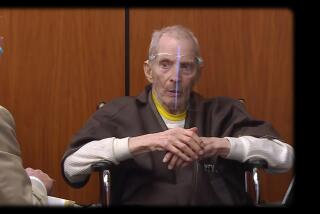Questions we’d like to ask ‘The Jinx’s’ Andrew Jarecki and Marc Smerling
- Share via
For many viewers, Sunday’s finale of “The Jinx: The Life and Deaths of Robert Durst” finally settled any lingering questions about the guilt of its subject, wayward real estate heir and suspected killer Robert Durst.
But the six-part documentary, and in particular the final 40-minute installment, has raised a whole new batch of questions about director Andrew Jarecki, producer Marc Smerling and the (perhaps intentionally) obscured chronology they present in the series.
Unfortunately, after a few media appearances Monday morning, both men are now declining all press requests, including a scheduled interview with the Los Angeles Times, citing the likelihood of being called to testify in the Durst case.
That doesn’t mean we don’t have questions for them. Here’s what we’d like to know:
* When did Sareb Kaufman find Durst’s 1999 letter to Susan Berman, and when did he share it with you?
* When did Kaufman receive Berman’s belongings, and why did he wait what seems like many years to go through them? What prompted him to do so? And how did he know that the 1999 letter was a significant enough find to alert you?
* Did you consider sharing this evidence with police right away?
* How much time passed between the discovery of the 1999 letter and your second interview with Durst?
*When did the follow-up interview with Durst take place? Was it April 2012, as reported by the New York Times?
* Did the interview end immediately after you confronted Durst with the handwriting samples, as depicted in “The Jinx”?
* Did you know that Durst was still wearing a live microphone when he went to the bathroom?
* Given Durst’s habit of talking to himself on live microphones, didn’t you anticipate that he might do the same thing again -- particularly following such a stressful confrontation?
* How did it take two years to discover the bathroom audio? Again, considering Durst’s known tendency for muttering to himself on live mics, why didn’t someone listen to all the audio sooner in the editing process?
* In the New York Times, you said the audio was discovered two years after the interview, but on “CBS This Morning” Jarecki appeared to hedge and said it was “many months” later. Can you clarify the timing?
* In the finale of “The Jinx,” you suggest that Durst’s arrest on a trespassing charge gave you the necessary “leverage” to get him to sit down for a follow-up interview. But that arrest occurred in August 2013, more than a year after that interview reportedly took place. Did you fudge the timeline? If so, why? Was it simply for dramatic purposes, or was there a strategic reason for this apparent misrepresentation?
* Was the “confession” in the finale edited in any way? Is there any audio before or after the clip we heard?
* When did you share the bathroom audio with police?
* If the audio was handed over “many months” ago, as Jarecki stated on “CBS This Morning,” do you have any idea why police would wait until the day before the finale to arrest Durst?
* The New York Times has reported that you began working with law enforcement in early 2013. Is this accurate, and what did this collaboration involve?
*If the New York Times report is accurate, then nearly three years passed between the second interview and Durst’s arrest Saturday in New Orleans. Given that you’d confronted him with highly incriminating evidence, did you worry that he might flee?
* Did you share any evidence with police that did not appear in “The Jinx”?
* If so, when did you share it?
* At what point in this project did you become convinced of Durst’s guilt?
* Do you think police dropped the ball at any point in this investigation -- particularly when it comes to Berman and the 1999 letter from Durst, which was found among her belongings?
* Were you concerned that if you handed over new evidence to police, they would botch the investigation?
* Have you had any contact with Durst since the series began to air?
Twitter: @MeredithBlake
More to Read
The complete guide to home viewing
Get Screen Gab for everything about the TV shows and streaming movies everyone’s talking about.
You may occasionally receive promotional content from the Los Angeles Times.






